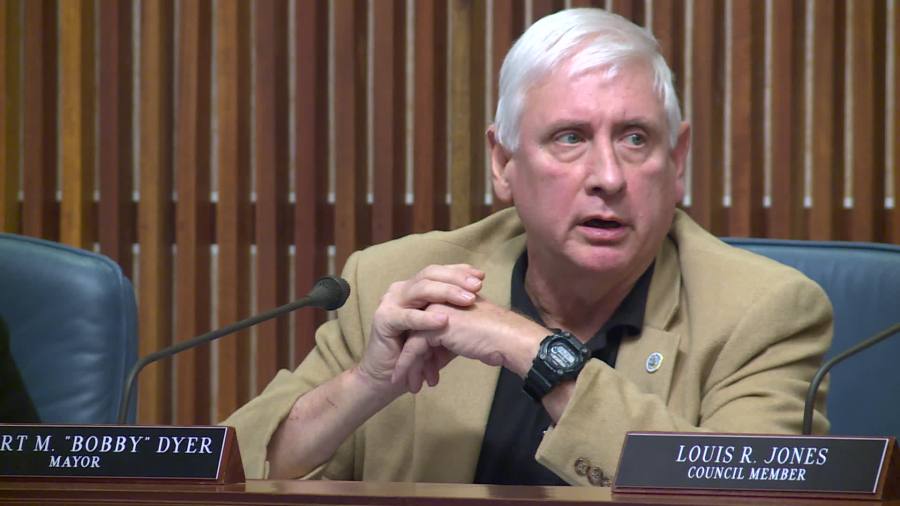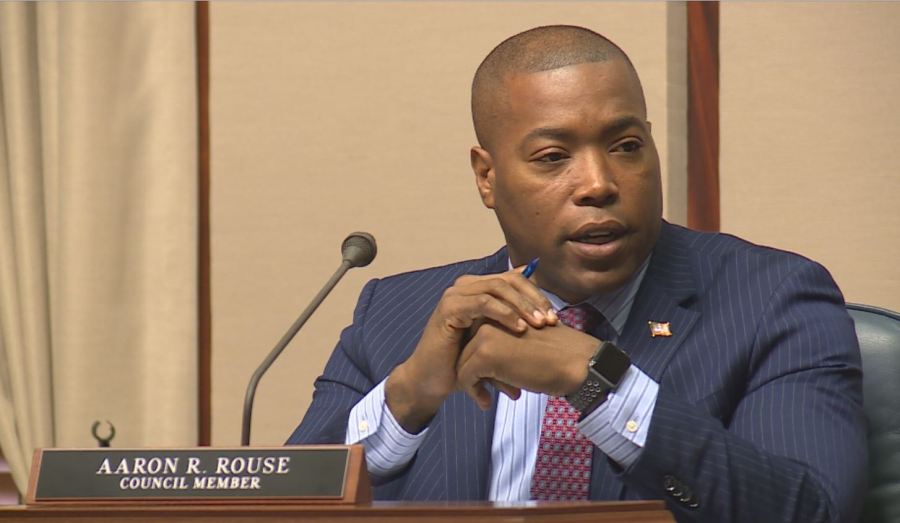VIRGINIA BEACH, Va. (WAVY) – After sharp discussion, primarily between Mayor Bobby Dyer and Councilman Aaron Rouse, Virginia Beach City Council voted 7-4 Tuesday to ask City Manager Patrick Duhaney to develop a public input process on the city’s election system.
Dyer, Vice Mayor Rosemary Wilson, and council members Michael Berlucchi, Linwood Branch, Barbara Henley, Rocky Holcomb and Delceno Miles voted yes. Rouse, along with council members John Moss, Guy Tower and Sabrina Wooten voted no.
“Mr. Rouse and I, I’m going to be honest with you, we have friction between us,” Dyer said, “and I suspect that some of the animosity is against me for more political reasons than anything. I’m strongly endorsing his opponent (Kevin Adams),” accusing Rouse of “ad hominem attacks which do absolutely nothing.”


Rouse is running against Adams in the special election to fill Virginia’s Seventh District Senate seat vacated when Republican Jen Kiggans defeated incumbent Democratic Rep. Elaine Luria to represent the state’s Second Congressional District.
Dyer went on to say that “… perhaps Mr. Rouse, during his upcoming campaign, will cite all of his accomplishments. He has been unwilling to take phone calls from members of council and his constituents. And as a result, his lists of accomplishments are, at best, minimal.”
Rouse said his criticisms of the mayor have “never been personal.”
“When you say the outgoing council wants a chance to talk about this election system, well, they did,” Rouse said. “They voted to appeal it by millions of dollars. They had their opportunity, their say. When you say the ad hominem attacks, Mr. Mayor, I kept your record in front of the people. It’s been transparent. I’ve not attacked you personally as you’ve done me.”
The city’s new election system split council and the School Board seats into 10 districts with roughly 46,000 people in each, with only voters living within that district allowed to vote for candidates running in that particular district.
That’s a distinct change from the city’s longtime hybrid at-large system, in which those serving on the council or board had to live in certain parts of the city, but every voter could vote for every member. That system had been in place in Virginia Beach since 1966.
Virginia Beach residents Latasha Holloway and Georgia Allen filed the complaint about the voting system in 2017, saying the longtime system “has the effect of diluting or minimizing ‘minority voting strength’ and was adopted to ‘promote racially discriminatory objectives.'”
The change in the voting system this year came after the U.S. District Court for the Eastern District of Virginia ruled last December that the longtime system “denies Hispanics, African Americans and Asians equal access to the electoral and political process.”
However, in late July, following an appeal from the city, the Fourth Circuit U.S. Court of Appeals vacated the federal court ruling, but it took place after candidates for the 2022 general and special elections had qualified, and the Nov. 8 general and special elections took place under the 10 district ward system that had been ordered by the federal court.
City Council has to enact a “decennial” redistricting plan – one updated every 10 years – before the November 2024 general election.
The resolution council adopted calls for Duhaney to develop a public information and input process beginning in January that includes holding multiple public briefings and input sessions during the daytime and evening, and at different locations in the city.
It also says a webpage and web tool has to be set up to allow residents to submit comments online, and allow the public other opportunities to provide input at the recommendation of the city’s communications office.
As part of the public information and input process, the city attorney’s office “is authorized to provide public briefings discussing the prior litigation and existing legal precedents and statutes applicable to potential election methods to community groups and organizations when requested by any member of the City Council.”
It calls for the public input process to be “substantially completed” before Aug. 23, 2023, the deadline to request a referendum election to be held at the Nov. 7, 2023 election.
Wilson said she supported the mayor’s resolution, citing the need for public engagement.
Wooten, in opposing the resolution, said when she first ran for council in 2018, people told her they didn’t understand why the city didn’t have a district voting system.
“I heard, in that time, that that’s what the people wanted,” Wooten said. “And they always wanted that type of system because they wanted to choose their own district representatives, who would focus on issues in their district. That’s what they always wanted. That’s what I’ve always heard.”
Responding to those who said what danger would there be in allowing for public input, Wooten said “the danger is, some can finagle wording, finagle legislation to get us to a place where we don’t want to be, and the people are here because they are being proactive because they see the writing on the wall. That’s how it starts. They’re paying attention. You have to pay attention to these seemingly simple resolutions and legislation. It may seem on its face, very simple, very simplistic, but it will have repercussions that will be astronomical. That’s not what we want.”
Dyer, ahead of the vote, said he needed to respond to some of what he said were personal attacks on him, rhetoric and misinformation.
“At no time did my bringing this forward … was designed to revert back to the old system,” Dyer said. “Did not happen. I realize a form of district voting is here to stay, but once again, we have a split community of people who want this, and don’t.”
Rouse was critical of the timing of the resolution, on council’s last meeting of the year before a new council is seated. That new council, he said, should decide on such a resolution, not the outgoing one.
“You don’t bring this important topic up on the last day of the year for city council and expecting, what, support for this,” Rouse said. “You have already violated procedural.”
Moss, in a Facebook post, said Rouse was correct to say that Dyer never discussed his initiatives “and misrepresented in the Council briefing sheet that inferred Council as (a) body supported his initiative.” He also said there was no reason to vote on the matter with five members leaving council at the end of the year.
Moss said Dyer’s proposal should be deferred until January, when it could get further discussion, and so council could understand “what is within the legally possible.”
Dyer said he waited until the final meeting of the year because the outgoing council has been under scrutiny and said it was a matter of fairness to residents.
“All we’re asking is, let’s bring the public to the table, and the new council members are going to have to deal with the input that’s coming,” Dyer said.
Holcomb asked City Attorney Mark Stiles whether there was any need for public input because there was nothing the council could do.
Stiles said there were options for the council to consider that “would meet muster.”
“I will tell you that a system with a significant number of at-large votes will again be challenged in federal court,” Stiles said, “and the likely result that you will get at the trial court level, and in the Fourth Circuit, it will be difficult to get a different decision in either of those two courts.
“I will also tell you that the Virginia Voting Rights Act, as we’ve been calling it, contains even fewer defenses to at-large seats than does the federal law, so any lawsuit filed under that act will also be a challenge to defend.”

























